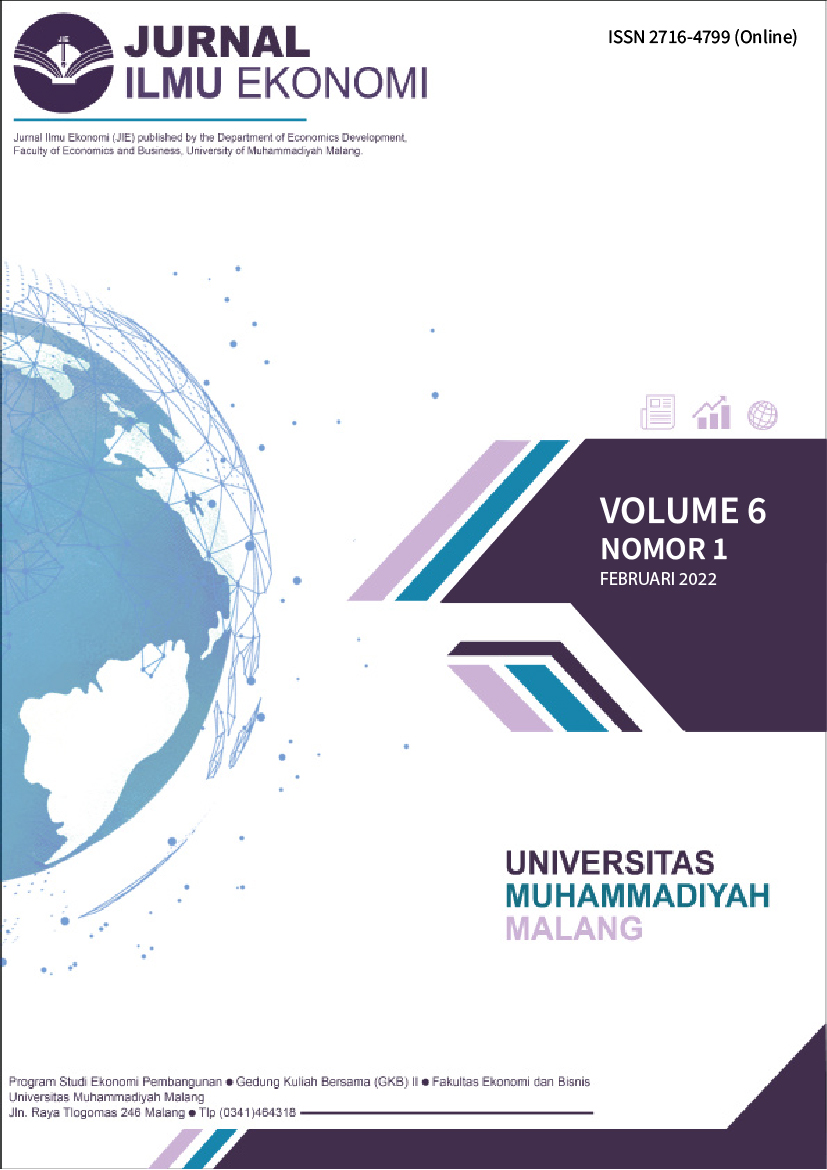Analisis Pengaruh Jumlah Industri, Nilai Investasi, Dan Nilai Produksi Terhadap Penyerapan Tenaga Kerja Sektor Industri Kecil Dan Mikro Di Jawa Timur
DOI:
https://doi.org/10.22219/jie.v6i1.19129Abstract
The economic development of a country or region is basically closely related to human resources, natural resources, technology, capital, and others. The role of humans is very important to manage, develop and develop their regions both economically and with workforce readiness. The success of regional economic development can be measured by high economic growth and increased employment. The economic growth approach is widely used in several regions in developing regional economic sectors which are expected to increase employment. The absorption of Regency and City workers in East Java shows that they are in the medium category, the lowest employment is in Batu City as many as 20,000 workers throughout 2016-2020. The number of IKM, Regency and City businesses in East Java is in the medium category, namely 18 districts and cities from 37 districts and cities. There are 8 districts and cities in the high category where the largest number of IKM companies are in Malang district with a total of 39,970 companies. Meanwhile, judging from the investment value in the medium category, only Malang and Surabaya regencies are included in the high category. And the production value there are 5 districts and cities with a high category where Malang Regency is one of the largest with an average of 8.177.
Downloads
References
Dharma, B. D., & Djohan, S. (2016). Pengaruh investasi dan inflasi terhadap penyerapan tenaga kerja melalui pertumbuhan ekonomi di Kota Samarinda. KINERJA, 12(1).
Ganie, D. (2017). Analisis Pengaruh Upah Tingkat Pendidikan Nilai produksi Dan PDRB Terhadap Penyerapan Tenaga Kerja Di Kabupaten Berau Kalimantan Timur. Jurnal Eksekutif, 14(2) 332-354.
Indrajaya, I. G. B., & Ningsih, N. M. C. (2015). Pengaruh Modal Dan Tingkat Upah Terhadap Nilai Produksi Serta Penyerapan Tenaga Kerja Pada Industri Kerajinan Perak. Jurnal Ekonomi Kuantitatif Terapan, 8(1), 44330.
Nasution, Z. (2018). Analisis Investasi, PAD dan Jumlah Unit UKM Terhadap Penyerapan Tenaga Kerja UKM di Kabupaten Labuhanbatu. ECOBISMA (Jurnal Ekonomi, Bisnis dan Manajemen) 5(1) 1-11.
Nayla, A. P. (2014). Komplet Akuntansi untuk UKM dan Waralaba. Jogjakarta: Laksana.
Prabandana, R. R. (2015). Pengaruh Modal, Nilai Produksi dan Tingkat Upah Terhadap Penyerapan Tenaga Kerja Industri Kecil di Kabupaten Sukoharjo (Doctoral dissertation, Universitas Muhammadiyah Surakarta
Putra, R. E. (2012). Pengaruh Nilai Investasi, Nilai Upah, dan Nilai Produksi Terhadap Penyerapan Tenaga Kerja Pada Industri Mebel di Kecamatan Pedurungan Kota Semarang. Economics Development Analysis Journal, 1(2).
Saputri, M. D. (2018). Analisis Pengaruh Jumlah Unit Usaha, Investasi dan Upah Minimum terhadap Penyerapan Tenaga Kerja pada Sektor Industri Pengolahan Besar dan Sedang di Kota Surabaya Tahun 2005-2014. JEB17: Jurnal Ekonomi dan Bisnis, 3(01).
Saputri, M. D. (2018). Analisis Pengaruh Jumlah Unit Usaha, Investasi dan Upah Minimum terhadap Penyerapan Tenaga Kerja pada Sektor Industri Pengolahan Besar dan Sedang di Kota Surabaya Tahun 2005-2014. JEB17: Jurnal Ekonomi dan Bisnis, 3(01).
Simanjuntak. (2002). Payaman, Pengantar Ekonomi Sumber Daya Manusia. Jakarta: Lembaga Penerbit Fakultas Ekonomi Universitas Indonesia.
Tahir, K. (2018). Pengaruh Pertumbuhan Ekonomi Investasi, Upah Minimum Provinsi Terhadap Penyerahan Tenaga Kerja Di Sulawesi Selatan. Jurnal Ekonomi Bisnis Syariah, 1(2), 110-132.
Tambunan, T. T. H. (2001). Transformasi Ekonomi di Indonesia. Jakarta: Salemba Empat.
Tapparan, S. R. (2017). Pengaruh upah minimum dan investasi terhadap penyerapan tenaga kerja di Provinsi Sulawesi Selatan. Jurnal Ad'ministrare, 4(1) 7-14.
Yuliastuti, A. (2018). Dampak Investasi Dan Tenaga Kerja Asing Terhadap Penyerapan tenaga kerja Tenaga Kerja Asal Indonesia. Jurnal Ketenagakerjaan, 13(1).
Downloads
Published
How to Cite
Issue
Section
License
Copyright (c) 2022 Dewi, M. K. & Syaifullah, Y.

This work is licensed under a Creative Commons Attribution-ShareAlike 4.0 International License.
Authors who publish with this journal agree to the following terms:
- For all articles published in the JIE (Jurnal Ilmu Ekonomi), copyright is retained by the authors. Authors give permission to the publisher to announce the work with conditions. When the manuscript is accepted for publication, the authors agree to the automatic transfer of non-exclusive publishing rights to the publisher.
- Authors retain copyright and grant the journal right of first publication with the work simultaneously licensed under a Creative Commons Attribution-NonCommercial-ShareAlike 4.0 International License that allows others to share the work with an acknowledgement of the work's authorship and initial publication in this journal.
- Authors are able to enter into separate, additional contractual arrangements for the non-exclusive distribution of the journal's published version of the work (e.g., post it to an institutional repository or publish it in a book), with an acknowledgement of its initial publication in this journal.
- Authors are permitted and encouraged to post their work online (e.g., in institutional repositories or on their website) prior to and during the submission process, as it can lead to productive exchanges, as well as earlier and greater citation of published work (See The Effect of Open Access).
This is an open access article and licensed under a Creative Commons Attribution-NonCommercial-ShareAlike 4.0 International License








